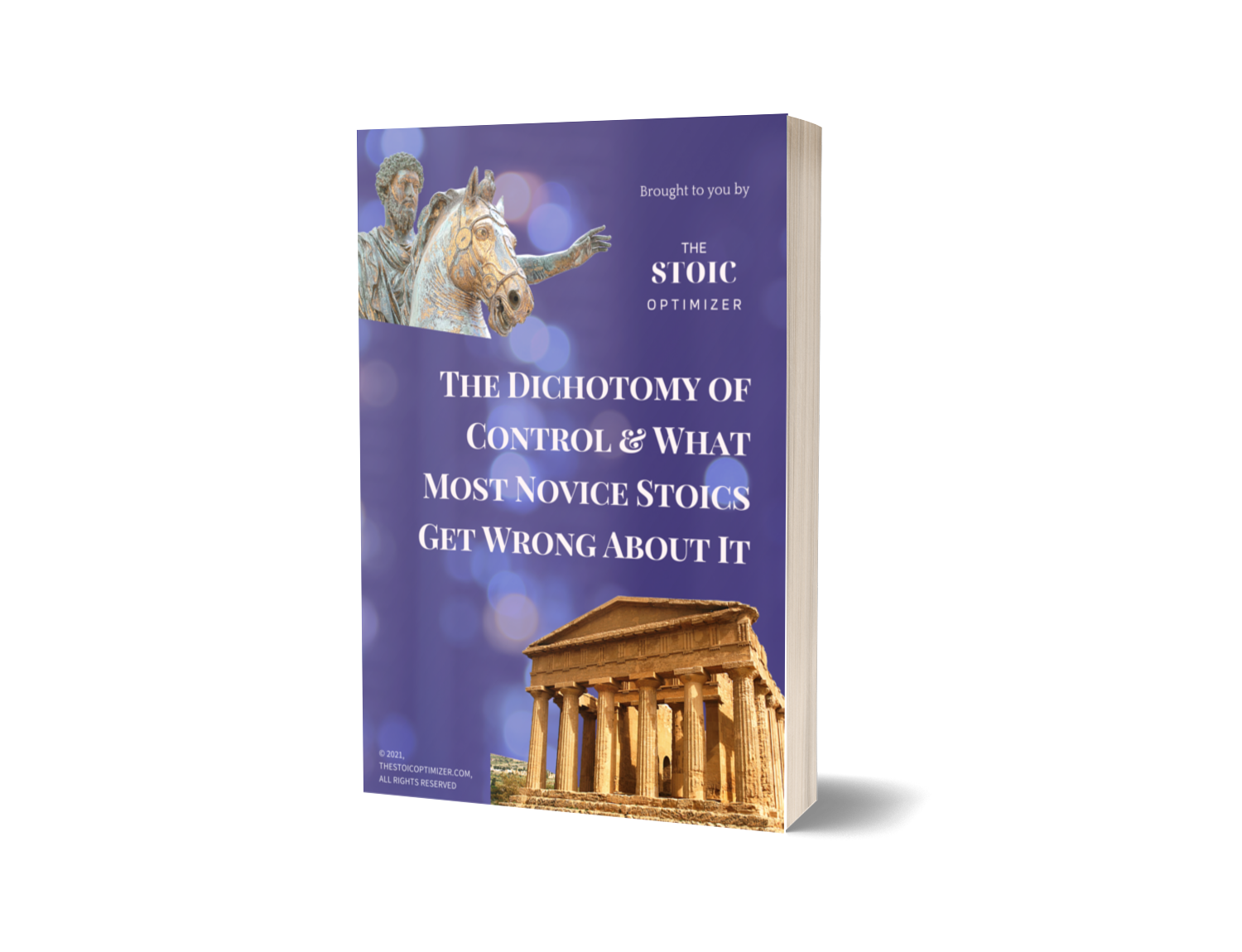To put Stoicism into context, allow me to borrow a quote from a realist French novelist:
“Just when the gods had ceased to be, and the Christ had not yet come, there was a unique moment in history, between Cicero and Marcus Aurelius, when man stood alone.” -- Gustave Flaubert
Flaubert lived in the 19th century, so he couldn't have imagined that Stoicism would be having another cultural moment in the 21st century. But there are striking similarities between the turmoil that was felt in those times and the uncertainty so familiar from our own existence. It appears that political chaos, fast-paced societal changes and a general sense of displacement are fertile grounds for a philosophy that gets the balance between rationality and the acceptance of destiny just right.
I wouldn't be surprised if whoever will be documenting this ages from now might even be able to paraphrase him: "Right after the Internet emerged and life sped up considerably, and the Singularity had not yet come, there was a unique moment in history when man stood alone" (and Stoicism was revived). It begs the question ... What is Stoicism? I'll do my best to explain it succinctly, but feel free to use the table of contents to navigate through the post if you're pressed for time.
What Is Stoicism?
... aside from being the answer to all of your problems, that is. Too soon? Let me explain.
As any self-respecting philosophy would, Stoicism attempts to define what it is to live a good life and to provide a system to ensure that its disciples actually stay on track. The philosophy of Stoicism is deeply rooted in rationality and its proponents (which I will discuss later in the post) maintained that the most rational thing one could do was live in accordance to the laws of nature. They didn't mean the laws of physics (since let's face it, it's not really a choice whether you abide by those, flat-earthers be damned!), but rather to accept destiny and be at peace with whatever happens to you. While this may seem like flirting with fatalism, it's also important to note that they identified virtue as the only worthwhile pursuit of human existence. The word is the best approximation of the Greek arete, which can also be translated as moral excellence. So if you're a Stoic, you can't get away with mere detachment towards outside events, you have to be the best version of yourself before you're off the hook.
Some scholars argue that achieving tranquility rather than virtue was the main promise of Stoicism, although I would say the former is just a side-effect of the latter.
Oh, and stoic is not the same as Stoic. The former describes a person who is completely indifferent to their emotions, while the latter is an adherent of the Stoic philosophy. The common usage of the lowercase adjective derives from a misunderstanding of the core principles of Stoicism, as we shall see in what follows.
Principles & Practices of Stoicism
To better understand the Stoic doctrine, let's investigate some of the principles and practices behind it. If some of them remind you of cognitive behavioral therapy (CBT), that's not a coincidence; therapists have borrowed a lot from this ancient philosophy. Some even credit Marcus Aurelius with the invention of (gratitude) journaling, which psychologists never fail to recommend.
The Dichotomy of Control
If you employ a single Stoic technique in your daily life, I would strongly suggest you pick this one. As they say in business... do the 20% of things that bring 80% of results.
First of all, let's clear the linguistic fog: a dichotomy is a classification that separates objects into two different categories. The dichotomy of control uses our area of control as the criteria for separation, which means that everything we encounter is either in our control or it isn't. (Don't start calling me Captain Obvious just yet and let me explain why this is useful.)
So what goes where? Well, I'm sorry to disappoint you, but only 2 things are truly within your control: your actions (including your reactions to the outside world) and your mind. Everything else falls in the other category.
The Stoics argued that a wise person should only focus on the things that are within their control and that most (if not all) of the misery we feel is a direct result of failing to do so.
(There's a common misconception that Stoicism promotes indifference, a myth which I debunk here.)
Memento Mori
Translated literally, memento mori comes from Latin and means "remember that you will die". The Stoics believed that life cannot be lived well unless we always keep in mind that we might cease to exist at any moment.
They didn't use this phrase to induce anxiety in themselves, but rather to cultivate a sense of gratitude for having had the chance to live another day. By constantly acknowledging the ticking clock of our existence, we will more readily behave in a way that maximizes virtue. (You can read more about it here.)
Premeditatio Malorum
Another slightly gruesome one is premeditatio malorum which invites the Stoic disciple to ponder everything that can go wrong. From minor annoyances like missing the train, to losing loved ones, a wise person should be constantly practicing negative thinking in order to train themselves for the very real possibility that the worst case scenario can happen. In this way, if it does, they will be better equipped to remain calm in the face of adversity. (You can read more about it here.)
Amor Fati
Living in accordance to Nature involves accepting its whims, as they are delivered by the goddess of fortune (aptly named Fortuna). The Stoics coined the phrase amor fati to symbolize the love of one's destiny and an acceptance of it as an opportunity to prove one's virtue no matter the circumstances. (You can read more about it here.)
The View From Above
Aside from meditating on their mortality, the inevitability of destiny and all possible misfortunes that could befall them, the Stoics made a point of reminding themselves of their place in the Universe. This technique was meant as a humbling experience, as well as a comforting one. In moments of great ego, the practicing Stoic should ponder his insignificance in the grand scheme of things, while in distress he should take the view from above to observe that his or her problems are just as small when considering the bigger picture.
The 4 Stoic Virtues
Although the 4 virtues were not Stoic per se - as they had been around in Ancient Greece even before Stoicism - they are useful in decoding the moral compass of the philosophy and they provide more actionable directions than the more general concept of virtue which was discussed above.
Courage
The Stoics recognized that fear is inseparable from human nature, so conquering it is a constant combat that requires strength to face. Courage is needed in glorious battles, but also in everyday life - to get out of bed, face another day and do what's right even when we don't feel like it. This virtue symbolizes the commitment of the wise to fight their fears and not abandon the battle even if it cannot ultimately be won (Death will prevail).
Temperance
This virtue is cultivated whenever we resist our impulses and consciously decide to do everything in moderation. The Stoics did not advocate for complete austerity, but warned against the dangers of overindulgence. Practicing temperance is a training in achieving freedom, since you will no longer be dependent on outside things. It will also make you stronger by eliminating weak points such as addiction, so its value transcends morality.
Justice
The 3rd virtue is responsible for guiding the Stoic in relation to others and to the environment. It necessarily implies obeying the law, but goes beyond that and functions as a moral compass even for situations that fall outside of the legal realm. Of course, if something is legal, it doesn't necessarily mean that it is also moral; justice is what ought to drive one to think of the greater good instead of just acting in self-interest.
Wisdom
Last, but not least, wisdom is the virtue that allows a Stoic to make a distinction between things which are good, evil or indifferent. While the meaning of good and evil is fairly easy to understand, it is worth looking at the last category a bit more closely. To put it simply, what does not stand in one's way of living a virtuous life is considered indifferent. For example, good health, while desirable (thus referred to as a "preferred indifferent"), is neither a prerequisite for living a virtuous life, nor should its absence push one away from an upstanding existence.
Here is a more detailed description of the 4 cardinal virtues, if you're interested.
Origins & Prominent Figures
Stoicism appeared a century after Socrates and quickly spread in Athens for a few decades before it was exported to Ancient Rome, where it was (arguably) brought to its epitome. The doctrine, called Stoa, owes its name to the meeting place of the early Stoics - the Stoa Poikile - literally translated "the painted porch", which was in fact a painted collonade.
To understand the context in which the philosophy emerged, it's interesting to note that epicureanism was also gaining attention in Athens at the same time, so in some ways it can be considered a "competing" philosophy, especially upon closer examination of its tenets. Epicureans considered that the pursuit of pleasure was the only goal worth pursuing. (Before you laugh at them derisively, I need to mention - to their defence - that they considered mental pleasure to be superior to the physical.)
The Cynics were also part of the landscape, but their penchant for extreme starkness made their philosophy go out of fashion quickly.
Stoicism appeared to strike a balance between the two, which could explain its sudden spike in popularity.
There are several Stoic philosophers we know from Antiquity, but since this is Stoicism 101, I will only focus on introducing the most prominent figures (in chronological order).
Zeno of Citium
Zeno of Citium is considered to be the founder of Stoicism and the story of his life is in itself a striking embodiment of the philosophy. Zeno was a Phoenician who was shipwrecked in Athens as he was sailing the seas trying to sell the purple dye his father produced. Instead of decrying his ill fate and the loss of his wealth, he embraced his new life and began visiting the local schools of philosophy before starting his own. He began to teach philosophy to a small group of followers at the Stoa Poikile and his legacy was carried forth by one of his disciples, who ended up in Ancient Rome.
Seneca the Younger
You've probably heard of Seneca, even if you never knew he was a Stoic. He wrote several tragedies and was an advisor to the Roman emperor Nero, which makes him the most controversial figure on this list. In "Letters from a Stoic" he gives practical Stoic advice to Lucilius in the form of letters about everyday life. No matter your experience with Ancient literature, you will benefit from reading the letters even if you're not a philosophy scholar - the style is accessible and the advice contained within is as applicable as it was 2000 years ago.
Epictetus
Epictetus was a slave with a knack for philosophy in Ancient Rome who eventually started his own school. He aimed to teach philosophy not as an abstract subject, but as a way of living a good life, so he focused on giving his students actionable advice about how to deal with the woes of existence such that they could still achieve tranquility. From responding to insults to dealing with the loss of a loved one, he left no stone unturned in discussing the art of living. He never wrote any books himself, but his teachings were passed down to us by Arrian - one of his students - who collected them in "Enchidrion" and in "Discourses".
Marcus Aurelius
The Stoic lineup is as diverse as it is impressive: the adherents of the philosophy truly came from all walks of life and prove that living a virtuous life is possible no matter who you are and where you come from. Marcus Aurelius, its most famous proponent, was a highly regarded Roman emperor who was determined to live a righteous existence and not let himself be corrupted by power. He collected his thoughts in "Meditations", thus laying the foundation for what we would call "journaling" today. His reflections on life are entertaining as well as instructive and they show a candor you will surely recognize in yourself. Set out to read him as if you're going on a walk with an old and wise best friend, for that is what he will inevitably become.
Books About Stoicism
If you're possessed by an insatiable thirst for the philosophy of Stoicism as a result of reading this post, then I've done my part!
Since I can't leave you without a cure for the ailment I've caused, I recommend you quench it either by going directly to the sources (the books I mentioned above when discussing their authors), or by looking towards more modern interpretations. Here are a few ideas:
Stoic Quotes
... to give you a taste of their medicine. (Click on the image to see an enlarged version.) For more, follow me on Instagram, Twitter or Facebook.






This post is part of a series called First Principles.
Read more about the foundations of the Stoic Optimizer philosophy from the other posts in the series:

